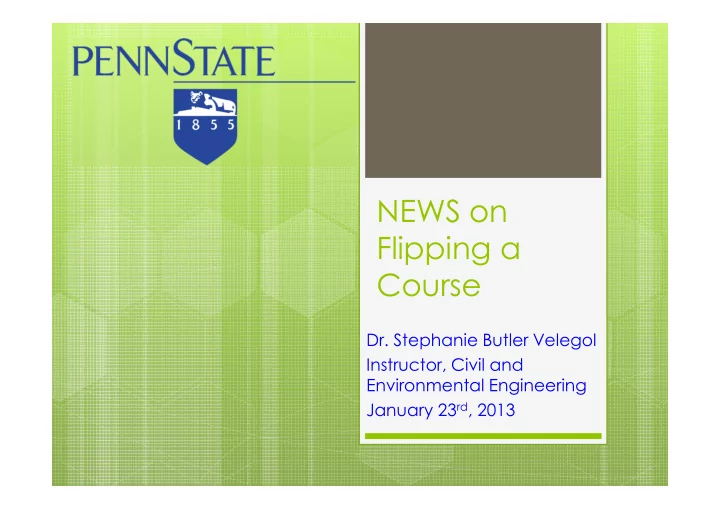

NEWS on Flipping a Course Dr. Stephanie Butler Velegol Instructor, Civil and Environmental Engineering January 23 rd , 2013
N.E.W.S. for flipped courses N o additional workload E xperiential learning in classroom W eekly assessment S hort videos segments < 10 minutes long
Flipped: Activity in class
Flipping: Active in Class and Timely Assessments Lecture Homework Quiz or Test After Class After Class In Class In Class T Next week Next week M, W, F Next week or later New Info Learning & Applying Assessment Before Class In Class After Class F In Class on Monday On M & W Before F Friday Watch videos Turn in Review Problem Take on-line Solving problems Problem assessment Prepare for Take Quiz Solving Quiz
N o additional workload � Don’t pile on additional assignments � Use class time to work on “homework” � Flip it – don’t double it.
E xperiential Learning in class � Students work on “Homework” after brief review � Brainstorm & Discuss � Field trips (split up the class of 90 students) Wastewater treatment plant Recycling tour LEED building � Group Projects?
W eekly Assessments � Pre-class Assessments on-line before class Tests general understanding Prepares them to work on Problems Handles Q & A � Weekly Quizzes in class on Friday 11 Quizzes in semester 30 – 40 minutes in length Students love Weekly Quizzes!
SHORT video segments - Keep between 5 – 15 minutes - Shorter attention span - Allows students to selectively review material - Each module < 2 hours
Videos with outline notes Made with Continuing Education office...
Another video option: Khan academy http://www.khanacademy.org/
If Dr. Velegol were teaching another course in your major and offered it as both a flipped course and a traditional (lecture based) course, which one would you choose? Total 66 Traditional 15 23% Flipped 51 77% Problem solving during class time (40%) Having more freedom in learning (40%) Being able to re-watch (30%)
40% mentioned Experiential learning We were able to work on the homework in class with other students . Being able to ask questions to the teacher is also a huge help. “I like … working on the homework in class because I have more questions about the homework than the lectures.” “..allows for the information to be put to real applications during class. Coming to class ready with questions or homework lets the student interact with the instructor more hands on.”
Short on-line lectures give more flexibility in learning “Flipped courses allow you to decide when you want to complete the work required for the week. “Flipping the course gave me more freedom toward how I wanted to complete the work. “It has given me the flexibility of choosing when to 'go to' a lecture.” 78% of students reported skipping less than 10 segments (out of 132)
Short Lectures allow reviewing of the lectures “The pause and rewind features of the flipped classroom eliminate the concern for copy notes quickly and allow me to pay more attention to the lecture .” “I watch the videos on my computer, if I miss something or if I just go into a daze for a minute, I can go back and watch that part again.” 83% of students reported re-watching at least 1 video segment
What are some of the concerns about flipping? Total 66 Traditional 15 23% Flipped 51 77% Takes too much time (5/66) Class time not valuable(5/66) Can’t ask questions (3/66) Less accountability (3/66)
N o additional work (truly flipping the course) will not take up more time Students reported spending less or the same amount of time as other classes (< 8 hours) 50% said 6 – 8 hours 40% said 3 – 5 hours
Lesson learned: Review less than 10 minutes per class “The flipped course was suppose to use class time to work on problems…we barely did work in class and went over the same material provided online .” “We wound up taking in class and didn’t get to do too much work .” How long should Dr. Velegol spend on reviewing the material in class? 40% said less than 10 minutes 40% said 10 – 20 minutes
W eekly Assessments allow MORE questions before class � Students are encouraged to ask questions and/or clear and muddiest points on on- line assessments before coming to class � Can review in class � More students ask questions!
W eekly Assessments help student’s accountability � Weekly assessment before class � Weekly quiz
Final Exam scores don’t change with teaching method 100 Average Final Exam Score 80 60 40 20 0
SO, why flip? � Students prefer it � Memorable Experiential Learning 79% of students agreed that field trips increased their interest in Environmental Engineering � Improved Classroom Climate Less blank stares – more interaction More enjoyable for Faculty!
N.E.W.S. for flipped courses N o additional workload E xperiential learning in classroom - Less than 10 minutes review - Field trips & discussions W eekly assessment - For accountability - For Q & A S hort videos segments < 10 minutes long
Recommend
More recommend